
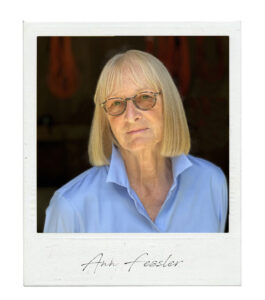
ANN FESSLER: Work In Time
Visual artist Ann Fessler will present a chronological survey of her creative practice as it has evolved over 40 years, from early artist’s books, films, and installations, to her current project which includes a limited-edition book with a unique component. Using both personal and cultural history as content, Fessler’s work addresses the gap between recorded history and lived history.
BIO: Ann Fessler is a non-fiction author, artist, and educator with a wide-ranging practice that includes photography, film, audio and video installations, and artist’s books. Fessler is Professor Emerita at Rhode Island School of Design, where she taught for 24 years and served as both the Head of the Photography Department and the Director of the Graduate Program in Photography.
She is the recipient of numerous awards and fellowships including a prestigious Radcliffe Fellowship from the Radcliffe Institute for Advanced Study at Harvard. Her non-fiction book The Girls Who Went Away (2006, Penguin Press) was chosen as one of the top five non-fiction books of the year by the National Book Critics Circle, and her documentary film A Girl Like Her (2011, Women Make Movies) has been screened at film festivals internationally and subtitled in five languages.
Fessler has produced five artist’s books, including those published by Visual Studies Workshop, Nexus Press, Tyler Offset Press, and the National Museum of American Art. She is currently finishing a new hybrid photo book/artist’s book/memoir about her adoptive father called The Things He Gave Me and The Things I Took.
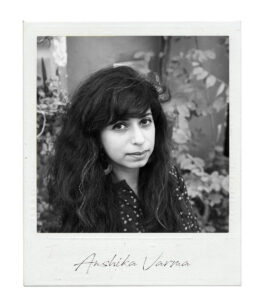
ANSHIKA VARMA: BookMaking as an Act of World Building
Publisher, artist and founder of Offset Projects, Anshika Varma will be sharing her perspectives on looking at the book as a site of inclusiveness and community building.
“In my work around imaginations of the book, I’ve come to see bookmaking not just as a technical process but as a preoccupation embedded in our minds for possible world creations. World-building, in this sense, is not simply about creating fictional realms but about reimagining what is possible, both for the artist and for the reader. Philosophically, world-building offers us a chance to reimagine reality—challenging normative ways of thinking, creating spaces for new experiences, and inviting us to reconsider what is possible. Audre Lorde’s call for artistic freedom and self-expression aligns with how we use the book form to create portals into alternative worlds—worlds that question dominant narratives and offer new ways of knowing. The act of world-building through the book form becomes an act of reclaiming power and rewriting histories. I am deeply inspired by the importance of love in Bell Hooks writing, placing it as a force that transcends the individual, shaping how we relate to each other and to the world. She suggests that spaces of freedom, like those created in radical pedagogies, allow for the development of more just, equitable worlds. In much the same way, the artist book can be seen as a vessel for this transformation: a space where we can experiment with different truths, where meaning is fluid and multifaceted, where new rules can be imagined, where reality itself can be questioned and where the reader, too, is invited to engage in the process of meaning-making.
At Offset Projects in Delhi, we have collectively realised how bookmaking, as a process of radical creation, offers both the artist and the reader the freedom to rethink and reimagine the world around us—producing worlds that are rooted in justice, inclusion, and transformative possibility.”
BIO: Anshika Varma’s practice engages with images, working with an interest in personal, collective and mythical histories. Combining her curiosity to study cultural and social evolution with storytelling, her work often looks at the emotional connection between an individual and their environment. With photography and book-making, she is interested in exploring the intricate relationship between memory and object as markers of one’s identity. The book becomes an important medium of work for the artist to align with her interest in the democratic dissemination of artistic expression and break notions of exclusivity in access and ownership of art. She is the founder of Offset Projects, an initiative working extensively on creating modes of access and creation within the photographic language with a focus on voices from South Asia and the Global South through activations from its public access library, workshops, residencies, artist talks, curated reading rooms and collaborative exercises in publishing.

APARNA NORI: Creating Visual Time Capsules
Through this short artist talk, Aparna will explore photobooks as repositories of lived experiences and micro histories and look at them as time capsules for future reference. She will speak about intentionally bringing together bodies of work, emerging from ongoing and contemporary photographic works or boxes of photos/ archival material, in the context of reframing narratives, look at personal histories, and creating a documentation of the times we live in.
While both her photobooks sit within this framework, she will reference them (along with the collective work Jolly Bird I made with the artist collective Kānike), the talk will also briefly look at other photobooks emerging from South Asia in the process, to see if they allow for additional readings over time, with changing contexts and landscapes.
BIO: Aparna Nori is a photographer and visual artist based between Singapore and India. She draws upon personal memory to have a dialogue with the quotidian. Her response is articulated through a range of mediums including alternative photographic processes, installations, video, digital photography and the book form. As a pedagogic extension of her practice, she continues to design and facilitate workshops to teach photography, bookmaking and alternative photographic processes.
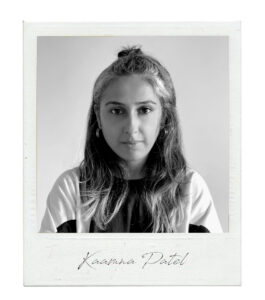
KAAMNA PATEL: On Building Independent Spaces for Photography
Kaamna Patel will present Editions JOJO, a publishing house & platform for visual art based in Mumbai. She will talk about her journey with JOJO as it metamorphoses, from a self-publishing practice to operating across multiple laterals as an artist-led, multidisciplinary platform for visual art.
BIO: Kaamna Patel is based in Mumbai, her home city, and works between France & India. Her work explores the periphery of photographic documentation, often with themes of satire, illusion & the impossibility of representation.
Her publishing house, Editions JOJO, was born as an extension of her practice with the book ‘In Today’s News: Alpha Males Women Power’ in May 2019. Editions JOJO has since metamorphosed into an independent publishing house, photobook library & an artist-led platform for visual art based in Mumbai where Kaamna embodies numerous roles. As a producer at Editions JOJO, she & her collaborators have executed several projects such as Kaghazi Pairahan: Publishing & Resistance in South Asia, the Glass Eye podcast & the YouTube series dedicated to photobooks called Between the Sheets. She is currently faculty at Paris College of Art & has been an artist in residence at the Cité Internationale des Arts in 2022 and 2023.
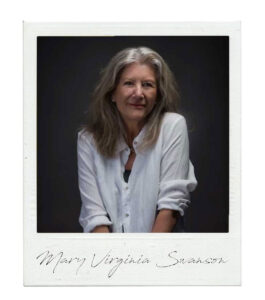
MARY VIRGINIA SWANSON: In Dialogue with Ann Fessler
Author Mary Virginia Swanson in a dialogue with Ann Fessler about the consistent themes and diverse forms of Fessler’s work and the influence of time-based media on her overall practice.
BIO: Mary Virginia Swanson’s in-depth knowledge and professional relationships throughout the photography industry encompass a broad range of perspectives on both the making and marketing of lens-based work. A respected educator and advisor, she frequently serves as a Portfolio Reviewer, Judge at contemporary photography, photobook, and photobook maquette competitions, conducts public presentations at festivals and lectures at many photography institutions each year. Through in-person mentoring, group workshops, and lecture-based online courses (La Luz Workshops) Swanson’s teachings have proven to aid photographers in advancing their careers.
Swanson is co-author with Darius Himes of the acclaimed Publish Your Photography Book(Radius Books, Third Edition (2023). The dedicated website for the book offers extensive downloadable publishing resources to help photographers on their publishing or self-publishing journey.
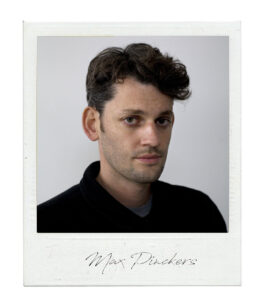
MAX PINCKERS: If the Heart Could Think it Would Stop Beating
Max Pinckers will give an improvised talk in which he speculates about documentary practice in relation to photobooks. For Pinckers, the book is the artwork—the final form in which he conceives and presents his work—and the reason he became dedicated to publishing and distributing himself, working closely with his partner Victoria Gonzalez-Figueras and their team. Departing from questioning photography’s visual conventions, Pinckers has developed a “speculative documentary” approach, in which he questions societal and political issues through and with images, brought together in books that entwine performativity, theatricality and collaboration with the documentary gesture.
BIO: Max Pinckers (1988, BE) grew up in Indonesia, India, Australia and Singapore, and is currently based in Brussels, where he was born. His work challenges the conventions of documentary photography by exploring theatricality, performativity and collaboration within documentary and photojournalism, made visible through the explicit use of cinematic lighting and staging in a documentary context. Photography, for Pinckers, is a speculative gesture that involves more than the mere representation of external realities. His approach to reality and truth is plural and malleable, open to articulation in different ways. Extensive research and teamwork are combined with improvisation to obtain lively, unexpected, critical, simultaneously poetic and documentary images.
His works take shape as self-published artist books and exhibition installations such as The Fourth Wall (2012), Will They Sing Like Raindrops or Leave Me Thirsty (2014), Margins of Excess (2018), Red Ink (2018) and State of Emergency (2024). Pinckers is a Doctor in the Arts and a guest lecturer at the School of Arts/KASK in Ghent. He has received multiple international awards, such as the Edward Steichen Award Luxembourg 2015 and the Leica Oskar Barnack Award 2018. Pinckers is co-founder of the independent publishing imprint Lyre Press and The School of Speculative Documentary. He is represented by Gallery Sofie Van de Velde in Antwerp and Tristan Lund in London.
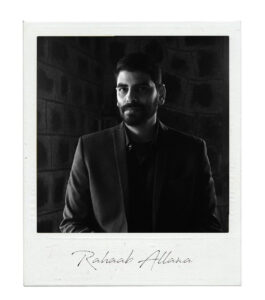
RAHAAB ALLANA: Listening to the Photobook
The talk is an exploration of how the photobook is a social contract that responds to the moment in open ended ways, but also asks what sensibilities can be shared, and what weight can be borne by the image today? In trying to listen to the voice of a book, how can we understand a form that has little disciplinary history in the subcontinent but be seen to work audaciously outside intended agendas and prescriptive models.
BIO: Rahaab Allana is a Curator/Publisher at the Alkazi Foundation for the Arts, New Delhi. A Charles Wallace grant awardee and Fellow of the Royal Asiatic Society (UK), he received his MA in Art History from the School of Oriental and African Studies, London and was Honorary Research Associate in the Department of Visual Anthropology at University College, London. He is the Founder of ASAP | art (Alternative South Asia Photography | Art), the region’s first app for presentation and discussion of contemporary visual cultural production. Allana works nationally and internationally with museums, archives, cultural initiatives/institutions, universities and arts festivals. He was Guest Editor for the themed issue Delhi: Looking Out/Looking In’, Aperture 243 (Summer 2021); Editor, Unframed: Discovering Image Practices in South Asia (HarperCollins Publishers India 2023); Editor Another Lens: Photography and the Emergence of Image Culture (Tulika Books and West Heavens, 2024), two critical Readers on lens-based practices, meta-histories of the image, and diverse trajectories inscribed by a range of practitioners in and from the region. He is on the editorial board of Trans Asia Photography, and the Arts and Culture Committee, Asia Society (India Chapter). He was recently awarded the ‘Officer of the Order of Arts and Letters’ from the Government of France.
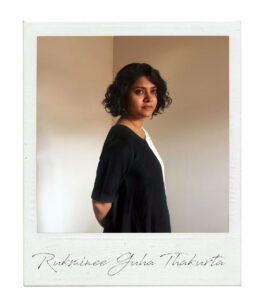
RUKMINEE GUHA THAKURTA: Never Caught Without a Book: A Practice in Editorial Design
Rukminee will talk about the trajectory of her work life, how she came to focus specifically on book design and how her design work continues to evolve. She will share short notes on some of her books along with visuals.
BIO: Rukminee Guha Thakurta is an independent graphic designer, teacher and writer. She works with museums, artists, collectors and publishers around the world and has been the recipient of the Deutscher Fotobuchpreis. Her work can be seen on her website letterpressdesignstudio.com and her Instagram handle rukminee_guha_thakurta.
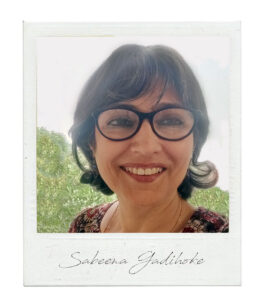
SABEENA GADIHOKE: Moderator – The Photo Book Maker: A Panel Discussion.
With Ann Fessler, Aparna Nori, Kaamna Patel, Mary Virginia Swanson, Max Pinckers, Rahaab Allana & Rukminee Guha Thakurta.
It might be argued that the book object with its material and affective engagement with photographs and paper takes the experience of ‘reading’ images further, towards public encounters in galleries, museums, festivals and multimedia projects, as well as more intimate engagements that are individual and often solo. What are the histories, journeys and challenges of producing the photo book that are specific to the subcontinent and how have these changed if at all (especially in the last two decades) from earlier iterations such as coffee table books or even photo albums? What are the shifts in terms of content? In other words, are there limits to what could be seen in a photo book? This is a question specific to new iterations of the personal but also responses to contemporary challenges of censorship in South Asia. How could one then think of form and design in ways that allow us to address these? What are the challenges and possibilities of publishing and funding photo books in a digital moment. The conversation seeks to explore some or perhaps all of these concerns.
BIO: Sabeena Gadihoke is Professor at the AJK Mass Communication Research Centre at Jamia Millia Islamia University, New Delhi where she teaches courses in Digital Media Arts, Documentary, Cinematography and Photography Studies. She has worked as an independent documentary filmmaker and cameraperson, and her book Camera Chronicles (Mapin/Parzor, 2006) is a biography of Homai Vyarawalla, India’s first woman press photographer. Sabeena is also a photo historian and curator, and her recent projects include Twin Sisters with Cameras: An Exhibition of photographs by Debalina Mazumder and Manobina Roy (co-curated) in Delhi, Calcutta, Bangalore and Lucknow (2022-23); Light Works, a retrospective of photographer Jitendra Arya, at the National Gallery of Modern Art, Mumbai and Bangalore (2017-2018) and several shows on Homai Vyarawalla including a retrospective at the National Gallery of Modern Art in Delhi, Bombay and Bangalore (2010-2011). Her research interests focus on the intersection of the still and moving image, and she has written on contemporary documentary, meta-histories of photography, visual popular culture, and female stardom in Bombay cinema. She is on the academic bodies of several universities, has served on various juries and is currently a member of the editorial committee of Trans Asia Photography.
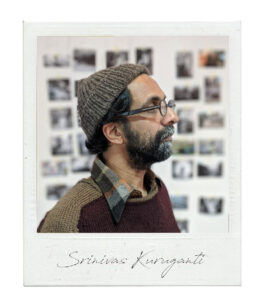
SRINIVAS KURUGANTI: Building from the Image
In this talk, Srinivas Kuruganti shares his journey of self-publishing his first photo book, exploring the challenges and methods of transforming ideas into a book form. From selecting images and designing the book to handling printing and distribution, he offers practical insights into the process.
BIO: Srinivas Kuruganti was born in Washington, D.C. but grew up in India. He returned to the United States to pursue a degree in Engineering. He currently lives in New Delhi. Kuruganti’s work mainly focuses on environmental issues, ranging from the ship-breaking yards of Bombay to the coal mining villages of Dhanbad. In 2001, he started working on a long-term photo essay on the AIDS epidemic in India.
He has been archiving his photographs of 30 years of travels in India, America, and Europe. He is developing three photo books drawing from his archives; one on mining in Central India, the second looks at his sixteen years spent in New York City and the third journeys through California which has been made into a book and launched in June 2024.
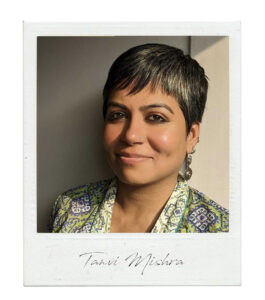
TANVI MISHRA: Moderator – Image Assembly: A Panel Discussion.
With her recently concluded workshop participants Balaji Maheshwar, Divya Cowasji, Percy Tabitha and Subash Sagar.
Over the course of nine months, in its pilot program the workshop Image Assembly was conceived to experiment with the practice of publishing. Conducted by Tanvi Mishra and Cecile Poimboeuf Koizumi, and assisted by Sukanya Baskar, this eight-month exercise culminated in individual work-in-progress photobook dummies. Along with four participants of the workshop, the panel will delve into the process of conceiving a form of the book suited to individual thematics and language. For all four artists, the photobook functions as an auto narrative. In one case, it is a classical observation of landscape and its influence on memory. For the others the photobook sits at the intersection of the cinematic, of the novella and of dialogue. In discussing their individual works, as well as citations from the workshop, the panel looks towards the expansive nature of the artist/photobook landscape for not just image-makers, but for all those working with images.
BIO: Tanvi Mishra works with images as a photo editor, curator, writer and educator. Among her interests are rights and representation in image-making, research strategies in visual culture as well as the notion of truth/fiction in photography, particularly in the current political landscape.
She has served as the Creative Director of The Caravan, a journal of politics and culture. She is part of the photo-editorial team of PIX, a South Asian publication and display practice. She has curated multiple exhibitions across South Asia including in India, Pakistan, Nepal and Iran. She was invited to curate the Louis Roederer Discovery Award for the 2023 edition of Recontres d’Arles. She has also been a part of the curatorial teams of Delhi Photo Festival, Photo Kathmandu and Breda Photo biennial. Her writing has been published in both editorial and academic publications including FOAM Magazine, WHY Exhibit: Positions on Curating Photography, and The Caravan. Mishra has taught with photo.circle, Pathshala South Asian Media Institute and VII Academy, served on various juries including World Press Photo and the Catchlight Global Fellowship and is currently part of the International Advisory Committee of World Press Photo.
Her practice across publishing, curating and writing foregrounds building kinship and solidarity, as tools to collectively imagine alternate, reparative futures.
PANELISTS:

Balaji Maheshwar
BIO: Balaji Maheshwar is a photographer and filmmaker from Chennai. He believes that his works are autobiographical in nature and that through his relationship with the outside world, he is able to observe and understand the inner being. The experience of having looked at death and loss closely and their repetition has made him look at life as one long tunnel through which we pass. Through his works, he enquires into themes of trauma, relationship, loss and living.
PANEL: Sometimes I think about how cinema suspended me and my family from reality. My family would have been very different if my grandfather had not left his hometown with dreams of becoming an actor. He was fascinated by the image of an actor that he saw on screen.
Cinema gave my family a time under the spotlight but the life we constructed around it crumbled after the death of my grandfather. It was my father who led me into the world of cinema and while he too dreamt of becoming an actor, his dream was star crossed. He struggled all his youth, only to make a fleeting appearance in a film. While we shared a close bond during my childhood, at some point in time, I began to drift away from him. There exists generational trauma within the family, and I looked for ways to overcome it.
“Dear Cinema,” is a work that began in 2013 when I started photographing single-screen cinema halls across Tamil Nadu. To confront the distance between me and my father, I began to spend more time with him, talking about cinema and photographing his daily life. This process led me and helped me to understand myself and my father through cinema and its many worlds that we knowingly wrap ourselves into.
Through the process of creating this book “Dear Cinema,” I realised what cinema gave and what it took.
Divya Cowasji
BIO: Divya Cowasji is a photographer and documentary filmmaker who lives in a small town in central India. Her work as a documentary filmmaker won her a National Award in 2015 for the documentary ‘Qissa-e Parsi’. Divya was also awarded the Inlaks Shivdasani Scholarship to spend two semesters studying alternate processes in photography at the International Center of Photography in New York. She was the India Photo Festival Grant recipient for 2021 and was a part of the Angkor Photo Workshops in Siem Reap in 2024. Her personal work focuses on the telling of oral histories, on ideas of home and family, memory, play and the body. She is part of 8:30, an emerging collective of women photographers from India.
PANEL: A bedtime story, a memoir, an inheritance, a fantasy. There Are No Love Letters Here weaves a tale of a family while recollecting those that were passed down over generations. It is ultimately an inquiry into the sum of its parts—an inquiry of the self.
Percy Kaki
BIO: Percy is a visual artist based out of Hyderabad, India. She works across mediums investigating memory and gender in the context of marginalisation and violence. Her practice interrogates history and identity of the marginalized through cultural practices and how it works in the personal, social and political. She was in Yakshi Constitutional Values in a praxis program working with marginalized women using art to understand the Constitution. Her works have been exhibited in numerous venues including the Kaghazi Pairahan: Publishing & Resistance in South Asia at Arles photo festival; Vanam Art Festival 2023 in Chennai and Fault lines – visual symptoms of discordance in Indian history at Conflictorium , Ahmedabad. Recently, her practice has comprised of public art especially working with women from marginalized communities around themes of self-respect and dignity. Community art has been instrumental in her practice to understand tools of organizing and how individuals belong to a community. She attempts to illuminate the vastly un(der)circumscribed imagistic history of the anti-caste struggle and the Dalit identity.
PANEL: This is a protest is an account of the after-life of the Tsunduru massacre1991. In an attempt to trace the event—both its occurrence and aftermath. I began a search through archival records. In the act of excavation, I was confronted instead with the absence of justice and a dissonance between the final judgment and the narratives of the survivors, and their kin, of this heinous caste-based killing. Through personal dialogue and the family album, my personal history became intertwined with historical fact. For me, the process of conceiving the book, as well as the object itself, is a register of protest against present day casteist society and its manifestation in cultural and social discrimination.
Subash Sagar
BIO: Subash Sagar lives and works in Madurai, India. He focuses on moments that provoke questions about life and its constant occurrence. Through his photographs, Subash aims to fill the void between him and the outside world.
PANEL: I spent my early years along the Vaigai River in Madurai, where my friends and I played hide and seek around the majestic neem trees that lined its bank. Those carefree days were filled with charm and wonder, but my connection to the river was severed when my family moved away.
Years later, through the process of creating this book Drift, I found myself returning to the river that flows through my hometown. I ended up revisiting the magical charm of childhood, the mythical nature of memory, and experiencing change not as a singular event but as a continuous, unfolding phenomenon.
Copyright © 2025, PhotoSouthAsia. All Rights Reserved.
Jan 11, 2025
India International Centre
Delhi, INDIA
Please refer to BIO, PRESENTATION & PANEL descriptions in the left column.
ONLY the first 35 registrations at the venue will be accepted!
09:30 – 10:15
Registration & Coffee
10:15 – 10:25
Introduction: Vasant Nayak
10:30 - 11:15
PRESENTATIONS:
Aparna Nori
Max Pinckers
Srinivas Kuruganti
11:20 – 12:50
PRESENTATION/CONVERSATION:
Ann Fessler & Mary Virginia Swanson
13:00 – 14:00
Lunch
14:10 - 15:10
PRESENTATIONS:
Anshika Varma
Kaamna Patel
Rahaab Allana
Rukminee Guha Thakurta
15:20 – 16:20
PANEL: The Photo Book Maker
MODERATOR: Sabeena Gadihoke
PANELISTS:
Ann Fessler
Aparna Nori
Kaamna Patel
Mary Virginia Swanson
Max Pinckers
Rahaab Allana
Rukminee Guha Thakurta
16:30 – 17:20
Coffee & Networking
17:30 – 18-30
PANEL: Image Assembly
MODERATOR: Tanvi Mishra
PANELISTS:
Balaji Maheshwar
Divya Cowasji
Percy Tabitha
Subash Sagar
20 November